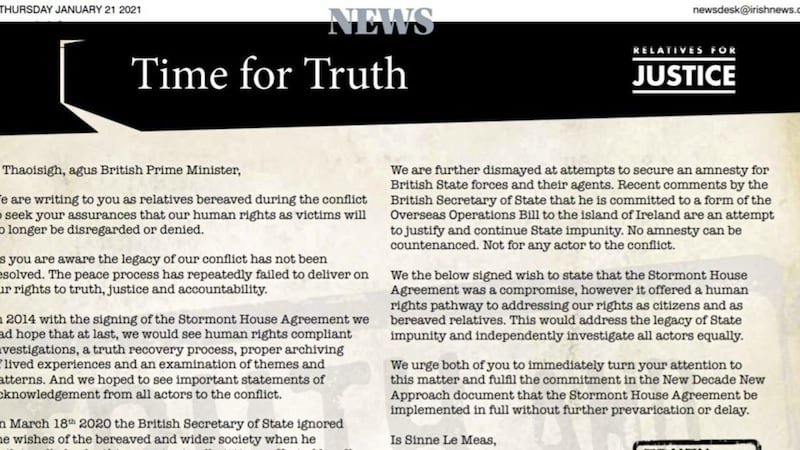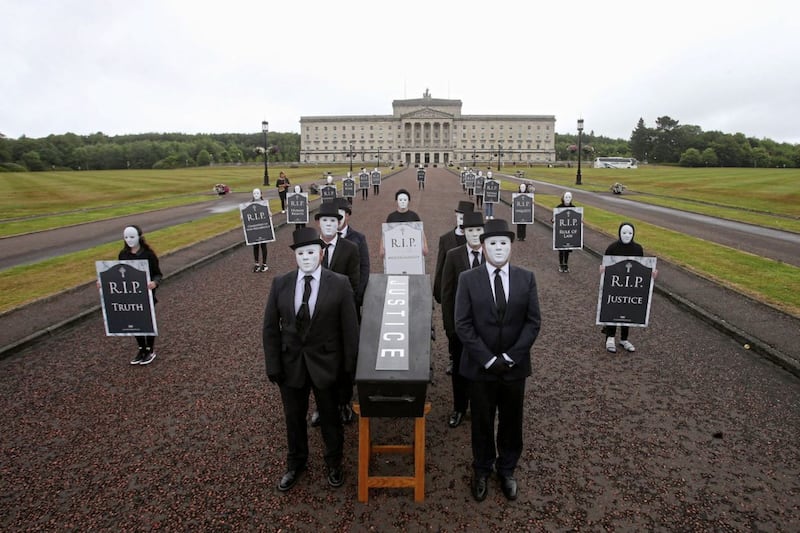RELATIVES of 3,500 people killed during the Troubles have penned an open letter calling on the British and Irish governments to implement proposals to deal with the past.
The unprecedented call to British prime minister Boris Johnson and Taoiseach Micheál Martin is today carried in several publications in Ireland and America and coincides with the inauguration of President Joe Biden.
The letter has been signed by relatives of people killed by loyalist, republican and state players during the Troubles.
Those who include relatives of those who died on Bloody Sunday and Sinn Féin TD Mairéad Farrell, whose aunt of the same name was killed by the SAS in Gibraltar in 1988.
Reached in 2014, the Stormont House Agreement included mechanisms for how to deal with the past.
Platform: Mark Thompson, Relatives for Justice
The deal included provision for setting up a Historical Inquiries Unit, an Independent Commission on Information Retrieval, an Oral History Archive and the creation of an Implementation and Reconciliation Group.
The British government has failed to implement the terms of the agreement and has suggested proposals to limit historical investigations.
Concerns have also been raised that the London government is considering an amnesty for British soldiers.
In the letter relatives have said there should be no amnesty "for any actor in the conflict".
"We the below signed wish to state that the Stormont House Agreement was a compromise, however it offered a human rights pathway to addressing our rights as citizens and as bereaved relatives," they wrote.
"This would address the legacy of state impunity and independently investigate all actors equally."
Paul McIlwaine, whose son David was killed along with Andrew Robb during a UVF-LVF feud in February 2000, explained why he signed the letter.
"It's the lack of investigation, cover up and collusion and I am completely opposed to an amnesty for security force members."
Brian Bradley, whose brother Francis was shot dead by the British army in February 1986, said his family has been waiting for almost 35 years for answers.
The 20-year-old was later added to the IRA's Roll of Honour and his family believes he was the victim of a ‘shoot to kill’ policy.
"Our family demands that the British government and the Secretary of State Brandon Lewis do what was promised and provide an inquest," he said.
"Our family and other families need closure, 35 years of waiting is not acceptable or excusable.
"I want an apology from them for firstly killing my brother and then making us wait for an inquest.
"I also want to know then it's going to take place."
Mark Thompson, chief executive of Relatives for Justice, which organised the letter, said about half of those who signed are 35 years old and under.
"This represents the current and future generations and underlines the ongoing trauma and intergenerational impact that the killing of a relative has also had on surviving families," he said.
"In many instances this younger generation are the very people who are raising these unsolved killings and engaged in legal processes on behalf of those who died without ever seeing truth or justice.
"It's also a clear indication that the past is ever present and speaks to a determination, now more than at other time, that following human rights violations the human rights of victims must frame how we address the past."








